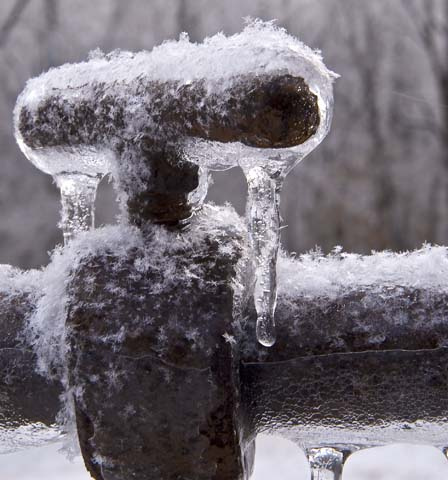Ways to Safeguard Plumbing System from Freezing: Critical Strategies
Ways to Safeguard Plumbing System from Freezing: Critical Strategies
Blog Article
How do you actually feel on the subject of Prevent Frozen Pipes ?

Cold weather can ruin your pipes, particularly by freezing pipes. Below's just how to prevent it from happening and what to do if it does.
Introduction
As temperatures drop, the danger of icy pipes boosts, possibly bring about costly repair work and water damage. Comprehending just how to stop icy pipelines is crucial for property owners in cold climates.
Avoidance Tips
Shielding vulnerable pipelines
Cover pipelines in insulation sleeves or utilize heat tape to shield them from freezing temperatures. Concentrate on pipelines in unheated or external areas of the home.
Heating techniques
Maintain interior spaces properly heated, specifically areas with plumbing. Open up cabinet doors to enable warm air to flow around pipes under sinks.
Just how to identify icy pipes
Try to find lowered water flow from taps, unusual odors or sounds from pipes, and visible frost on revealed pipelines.
Long-Term Solutions
Structural modifications
Consider rerouting pipes far from exterior walls or unheated areas. Include added insulation to attics, basements, and crawl spaces.
Upgrading insulation
Buy premium insulation for pipelines, attic rooms, and wall surfaces. Correct insulation aids maintain constant temperatures and minimizes the danger of frozen pipes.
Safeguarding Outdoor Plumbing
Yard tubes and exterior taps
Detach and drain yard pipes before winter season. Install frost-proof faucets or cover outside faucets with shielded caps.
Recognizing Frozen Pipelines
What triggers pipes to ice up?
Pipes ice up when subjected to temperature levels listed below 32 ° F (0 ° C) for extended durations. As water inside the pipelines ices up, it expands, taxing the pipe wall surfaces and possibly causing them to break.
Dangers and problems
Frozen pipelines can lead to water disruptions, residential or commercial property damage, and costly fixings. Burst pipes can flood homes and create extensive structural damage.
Indications of Frozen Piping
Recognizing frozen pipes early can prevent them from bursting.
What to Do If Your Pipes Freeze
Immediate actions to take
If you think frozen pipes, keep taps open up to relieve pressure as the ice melts. Utilize a hairdryer or towels soaked in hot water to thaw pipelines gradually.
Final thought
Stopping frozen pipes needs positive measures and fast actions. By comprehending the causes, indicators, and preventive measures, property owners can protect their pipes during winter.
Helpful Tips to Prevent Frozen Pipes this Winter
UNDERSTANDING THE BASICS: WHY PIPES FREEZE AND WHY IT’S A PROBLEM
Water freezing inside pipes is common during the winter months, but understanding why pipes freeze, and the potential problems it can cause is crucial in preventing such incidents. This section will delve into the basics of why pipes freeze and the associated problems that may arise.
THE SCIENCE BEHIND FROZEN PIPES
When water reaches freezing temperatures, it undergoes a physical transformation and solidifies into ice. This expansion of water as it freezes is the primary reason pipes can burst. As the water inside the pipe freezes, it expands, creating immense pressure on the walls. If the pressure becomes too great, the pipe can crack or rupture, leading to leaks and water damage.
FACTORS THAT CONTRIBUTE TO PIPE FREEZING
Low Temperatures: Extremely cold weather, especially below freezing, increases the risk of pipes freezing. Uninsulated or Poorly Insulated Pipes: Pipes located in unheated areas, such as basements, crawl spaces, or attics, are more prone to freezing. Insufficient insulation or lack of insulation altogether exacerbates the problem. Exterior Wall Exposure: Pipes running along exterior walls are susceptible to freezing as they encounter colder temperatures outside. Lack of Heating or Temperature Regulation: Inadequate heating or inconsistent temperature control in your home can contribute to frozen pipes. PROBLEMS CAUSED BY FROZEN PIPES
- Pipe Bursting: As mentioned earlier, the expansion of water as it freezes can cause pipes to burst, resulting in significant water damage.
- Water Damage: When pipes burst, it can lead to flooding and water damage to your property, including walls, ceilings, flooring, and personal belongings.
- Structural Damage: Prolonged exposure to water from burst pipes can compromise the structural integrity of your home, leading to costly repairs.
- Mold and Mildew Growth: Excess moisture from water damage can create a favorable environment for mold and mildew growth, posing health risks to occupants.
- Disrupted Water Supply: Frozen pipes can also result in a complete or partial loss of water supply until the issue is resolved.
WHY CERTAIN PIPES ARE MORE PRONE TO FREEZING
- Location: Pipes located in unheated or poorly insulated areas, such as basements, crawl spaces, attics, or exterior walls, are at higher risk of freezing.
- Exterior Pipes: Outdoor pipes, such as those used for irrigation or exposed plumbing, are particularly vulnerable to freezing as they are directly exposed to the elements.
- Supply Lines: Pipes that carry water from the main water supply into your home, including the main water line, are critical to protect as freezing in these lines can affect your entire plumbing system.
- Underground Pipes: Pipes buried underground, such as those connected to sprinkler systems or outdoor faucets, can be susceptible to freezing if not properly insulated.
https://busybusy.com/blog/helpful-tips-to-prevent-frozen-pipes-this-winter/

As a serious reader about Winter Plumbing Precautions: Preventing Frozen Pipes, I imagined sharing that blog post was worthwhile. Are you aware of somebody who is very much interested in the niche? Do not hesitate to promote it. Thanks a lot for taking the time to read it.
Visit Link Report this page